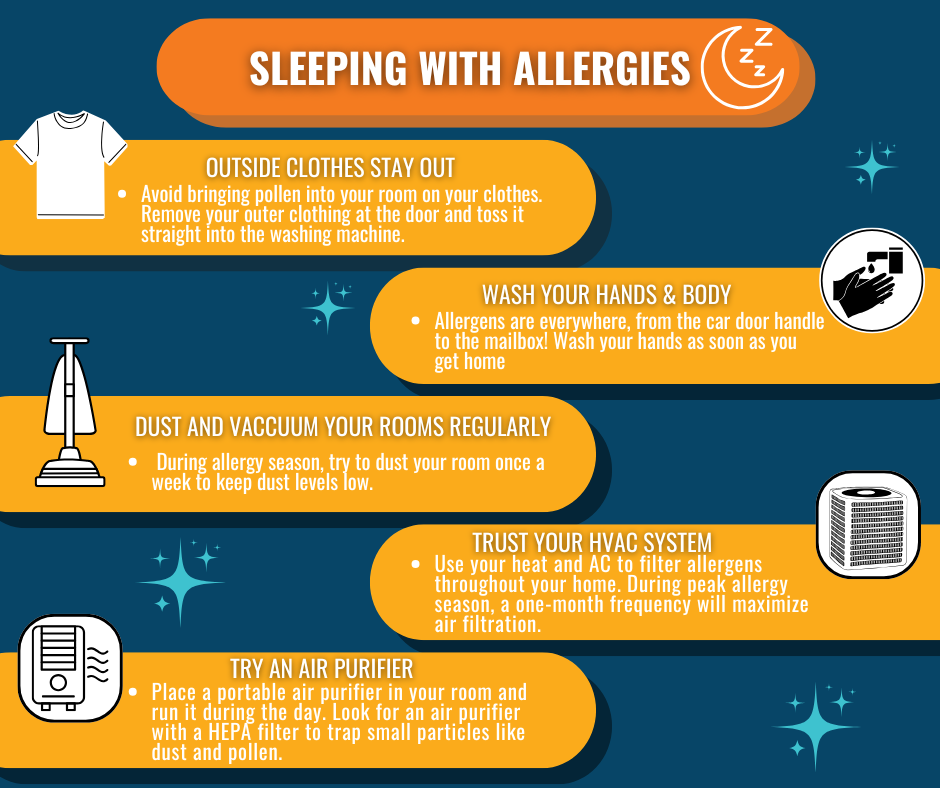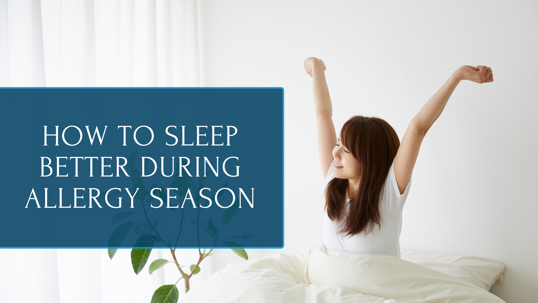Seasonal allergies can take a real toll on your quality of sleep. Long nights of wheezing, tossing, and turning leave allergy sufferers drained. This year, take control of your symptoms by prioritizing indoor air quality. Learn how small changes to your routine can pay off big with a good night’s sleep!
Allergies and Sleep: What’s the Connection?
Due to various factors, allergy symptoms can worsen in the evening. For example, histamine, the chemical that triggers allergy symptoms in the body, peaks in the evening. Similarly, pollen levels also tend to peak at dusk. Body position, temperature, and humidity shifts can all work against a good night’s sleep during allergy season.
Roughly 40% of Americans have seasonal allergies. Considerable research links allergies to poor sleep, which contributes not only to daytime fatigue but also to an increased risk of developing sleep disorders.

How to Tackle Allergies in Your Bedroom
You can reduce your exposure to seasonal or indoor allergens by:
- Keeping pollen out of your home. During allergy season, keep windows and doors closed, especially from late morning to early evening when pollen levels peak.
- Showering when you come inside for the day. When you get home, remove your outer layers of clothing at the door and shower to get pollen off your skin and hair.
- Cleaning and vacuuming frequently. Dust accumulates quickly in bedrooms because they tend to be closed off from the rest of the home. Dust and vacuum your bedroom frequently (at least weekly) to stay ahead of dust, pollen, and other contaminants.
- Keeping pets out of your bedroom. Pet hair and dander are two of the most common allergens that impact sleep. Provide your pet with a cozy place to sleep in a separate room or at least on the bedroom floor, and be sure to wash their bedding weekly.
- Maintaining your HVAC system. A well-maintained HVAC system is critical to indoor air quality because it filters the air as they run. Schedule annual maintenance and change the filter according to your unit's instruction manual (usually every 1-3 months).
- Using an air purifier. Air purifiers filter indoor air and improve circulation, lowering the concentration of allergens in your bedroom. Look for a portable air purifier with a HEPA filter, which is rated to trap the smallest airborne particulates.
Read More: How Indoor Air Quality Is Affected by An Older AC System
Will Sleeping with a Humidifier Help Allergies?
Some individuals find that using a humidifier can help alleviate their allergy symptoms. A portable humidifier can help thin mucus and moisturize nasal passages, making breathing easier. However, excessive humidity can lead to the growth of mold and mildew, which can worsen allergy symptoms. Keeping your home's humidity levels between 30% and 50% is recommended for optimal indoor air quality.
Where Should I Place My Air Purifier in My Bedroom?
Air purifier placement is critical for maximizing the device’s effectiveness. Ideally, place it near the middle of your room on a slightly elevated object, such as a sturdy shoebox.
The best place for an air purifier in a bedroom is where it can be seen from anywhere in the room. If visible and unobstructed, it can circulate and purify air unimpeded.
Take On Allergy Season with Help from Pro Plumbing Service Co.
Pro Plumbing Service Co. is your reliable partner for expert home services in the Lexington and Trinity areas. Our experienced professionals can help you explore ways to improve indoor air quality in your home and find the most cost-effective ways to breathe easier!
Call 336-892-8105 or contact us online to schedule HVAC, electrical, indoor air quality, or plumbing services in Trinity, Salisbury, and the surrounding areas.

